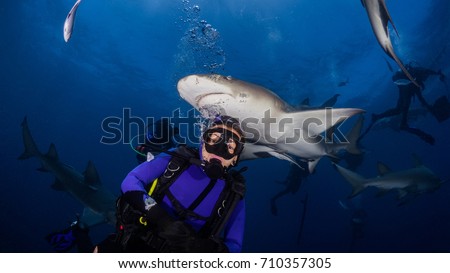It’s possible to find subtitles for almost every movie or TV series. And there’s also stock images with anything imaginable. Wouldn’t it be fun to connect this two things and make a sort of a filmstrip with a stock image for every caption from subtitles?
TLDR: the result is silly:
For the subtitles to play with I chose subtitles for Bob’s Burgers – The Deeping. At first, we need to parse it with pycaption:
from pycaption.srt import SRTReader
lang = 'en-US'
path = 'burgers.srt'
def read_subtitles(path, lang):
with open(path) as f:
data = f.read()
return SRTReader().read(data, lang=lang)
subtitles = read_subtitles(path, lang)
captions = subtitles.get_captions(lang)
>>> captions
['00:00:04.745 --> 00:00:06.746\nShh.', '00:00:10.166 --> 00:00:20.484\n...
As a lot of subtitles contains html, it’s important to remove tags before future processing, it’s very easy to do with lxml:
import lxml.html
def to_text(raw_text):
return lxml.html.document_fromstring(raw_text).text_content()
to_text('<i>That shark is ruining</i>')
'That shark is ruining'
For finding most significant words in the text we need to tokenize it, lemmatize (replace every different form of a word with a common form) and remove stop words. It’s easy to do with NLTK:
from nltk.corpus import stopwords
from nltk.tokenize import word_tokenize
from nltk.stem import WordNetLemmatizer
def tokenize_lemmatize(text):
tokens = word_tokenize(text)
lemmatizer = WordNetLemmatizer()
lemmatized = [lemmatizer.lemmatize(token.lower())
for token in tokens if token.isalpha()]
stop_words = set(stopwords.words("english"))
return [lemma for lemma in lemmatized if lemma not in stop_words]
>>> tokenize_lemmatize('That shark is ruining')
['shark', 'ruining']
And after that we can just combine the previous two functions and find most frequently used words:
from collections import Counter
def get_most_popular(captions):
full_text = '\n'.join(to_text(caption.get_text()) for caption in captions)
tokens = tokenize_lemmatize(full_text)
return Counter(tokens)
most_popular = get_most_popular(captions)
most_popular
Counter({'shark': 68, 'oh': 32, 'bob': 29, 'yeah': 25, 'right': 20,...
It’s not the best way to find the most important words, but it kind of works.
After that it’s straightforward to extract keywords from a single caption:
def get_keywords(most_popular, text, n=2):
tokens = sorted(tokenize_lemmatize(text), key=lambda x: -most_popular[x])
return tokens[:n]
>>> captions[127].get_text()
'Teddy, what is wrong with you?'
>>> get_keywords(most_popular, to_text(captions[127].get_text()))
['teddy', 'wrong']
The next step is to find a stock image for those keywords. There’s not that many properly working and documented stocks, so I chose to use Shutterstock API. It’s limited to 250 requests per hour, but it’s enough to play.
From their API we only need to use /images/search. We will search for the most popular photo:
import requests
# Key and secret of your app
stock_key = ''
stock_secret = ''
def get_stock_image_url(query):
response = requests.get(
"https://api.shutterstock.com/v2/images/search",
params={
'query': query,
'sort': 'popular',
'view': 'minimal',
'safe': 'false',
'per_page': '1',
'image_type': 'photo',
},
auth=(stock_key, stock_secret),
)
data = response.json()
try:
return data['data'][0]['assets']['preview']['url']
except (IndexError, KeyError):
return None
>>> get_stock_image_url('teddy wrong')
'https://image.shutterstock.com/display_pic_with_logo/2780032/635833889/stock-photo-guilty-boyfriend-asking-for-forgiveness-presenting-offended-girlfriend-a-teddy-bear-toy-lady-635833889.jpg'
The image looks relevant:

Now we can create a proper card from a caption:
def make_slide(most_popular, caption):
text = to_text(caption.get_text())
if not text:
return None
keywords = get_keywords(most_popular, text)
query = ' '.join(keywords)
if not query:
return None
stock_image = get_stock_image_url(query)
if not stock_image:
return None
return text, stock_image
make_slide(most_popular, captions[132])
('He really chewed it...\nwith his shark teeth.', 'https://image.shutterstock.com/display_pic_with_logo/181702384/710357305/stock-photo-scuba-diver-has-shark-swim-really-close-just-above-head-as-she-faces-camera-below-710357305.jpg')
The image is kind of relevant:

After that we can select captions that we want to put in our filmstrip and generate html like the one in the TLDR section:
output_path = 'burgers.html'
start_slide = 98
end_slide = 200
def make_html_output(slides):
html = '<html><head><link rel="stylesheet" href="./style.css"></head><body>'
for (text, stock_image) in slides:
html += f'''<div class="box">
<img src="{stock_image}" />
<span>{text}</span>
</div>'''
html += '</body></html>'
return html
interesting_slides = [make_slide(most_popular, caption)
for caption in captions[start_slide:end_slide]]
interesting_slides = [slide for slide in interesting_slides if slide]
with open(output_path, 'w') as f:
output = make_html_output(interesting_slides)
f.write(output)
And the result - burgers.html.
Another example, even worse and a bit NSFW, It’s Always Sunny in Philadelphia – Charlie Catches a Leprechaun.